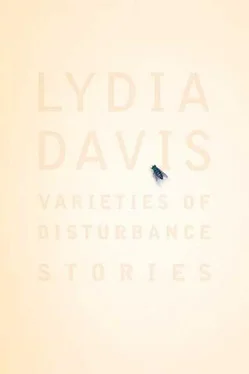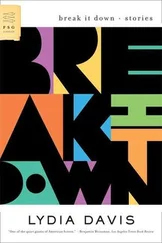At the same time, a bright red oil truck was fueling the boats. It would stop next to them on the pier where they were tied two or three deep alongside and send the long hose down into one, over one into the next, and then into the third. At the same time, a steel cable that extended the length of the pier into what seemed to be a fish-packing shed was being wound mechanically onto a drum in one of the fishing boats. The winding went on and on. A group of tourists watched this carefully, too.
The tourists took pictures of the fishermen mending their nets. If a tourist asked a fisherman to smile, the fisherman would glance up soberly, with a neutral expression on his face, and keep still for the picture, but he would not smile.
I went out to eat recently with the two old people and two old friends of theirs. We sat in a room surrounded by water and they all ordered lobster. The plates came, and the red lobsters looked pretty lying on their lettuce leaves next to their little white cups of melted butter. Now the conversation died and the table was silent except for the furious cracking, pulling, and prying of those old people, who suddenly showed such competent physical strength, intent on destroying their lobsters.
People I see here: the clerk at the post office; the friendly checkout woman at the supermarket; my neighbors; my landlady; the woman across the garden, who once asked me in a neutral, curious tone what I was doing here; last night, a plump, gregarious off-duty bartender attending the free movie at the public library, though I did not speak to him. He wore a bandanna tied around his forehead and cowboy boots. He was there to see the 1954 movie, whose title I forget. Most of the small audience were old people calling back and forth to each other.
“Everybody’s here!” someone cried.
I felt I was included in “everybody,” though I was sitting by myself waiting for the movie to begin. I listened to the bartender talk to the other people. Then we all watched the movie.
A plumber came to my room yesterday to fix the shower. He told me his family had lived here for generations. He said that these days there isn’t much cod or haddock and the fishermen are taking shellfish off the Great Bank about six miles west of the tip of the land; the beds there seem to be inexhaustible.
I have seen great crates of these shellfish, which I thought were quahogs, coming up onto the pier, hoisted by a small crane on a boat. The crates were stacked on the wharf while tractor trailers from Maryland with their engines running prepared to load them. Seagulls ran around on the asphalt with their wings raised threatening one another over the scraps. Only one gull sat on a crate at the top of a stack and pulled the slimy, elastic flesh of a quahog up through the slats, leaning back as he pulled, bending forward to get another grip, and leaning back again in the midst of a great noise from the boat’s engines.
This was at twilight, and as the sky darkened, the lights on the boats grew brighter, and a handful of tourists watched, standing gingerly at the edge of the pier. The young fishermen, bare-chested, wearing shorts and high rubber boots, went about their work steadily, maneuvering hooks, hoisting a dredger, then a large piece of grating. The boat’s engine throbbed, sometimes thundered.
On another night it was later. I was the only one watching. Sparks flew up into the darkness from a boat where something was being welded or soldered. Another boat set out to sea after blowing its whistle. A black fisherman ran to the stern of the boat as it pulled away. He looked up, smiled, and waved.
I have just come back from looking at the motorcycles on the pier. They are parked side by side in great numbers near the snack bars that sell such surprisingly good Portuguese fish soup. They are of all kinds, plain and fancy. The fancy ones are decorated with antlers, and with leopard skins.
More crickets are singing now as the air grows colder and colder. It is the last day of August and the season is changing suddenly. Just as it is time for me to leave, the historian, too, has finished his tour and will be returning to Europe.
Almost Over: What’s the Word?
He says,
“When I first met you
I didn’t think you would turn out to be so
…strange.”
At night he was a different man. If she knew him as he was in the morning, at night she hardly recognized him: a pale man, a gray man, a man in a brown sweater, a man with dark eyes who kept his distance from her, who took offense, who was not reasonable. In the morning, he was a rosy king, gleaming, smooth-cheeked and smooth-chinned, fragrant with perfumed talc, coming out into the sunlight with a wide embrace in his royal red plaid robe…
*She waits near the highway before the entrance of HoJo’s for the van going south. She is going south to meet a plane coming from the west. Waiting with her is a thin, dark-haired young woman who does not stop walking back and forth restlessly near her luggage. They are both early and wait for some time. In her purse she has two books, Worstward Ho and West with the Night . If it is quiet and she reads Worstward Ho on the way south, when she is fresh, she can read West with the Night on the way back up north, when it will be later and she will be tired.
†The van arrives and she takes care to sit on the right side, so that as they travel south the sun will not come in through her window but through the windows across the aisle from her. It is early morning, and the sun shines in through the windows
from the east. Later in the day, as she returns north, she thinks, it may be late enough so that the sun will come through the windows from the west.
The highway she travels crosses and recrosses a meandering stream that passes now northeast and now northwest under her. As long as she is alone, sitting in the back of the van, she does not read but looks out the window.
Soon the van pulls up in front of a shopping mall. The restless young woman with the dark hair immediately stands up and remains standing in the aisle looking at the other passengers and out the windows. Two women board the van. They smell heavily of face powder as they walk past her to sit in the back near her. Now, since she is no longer alone, she begins to read.
The van is quiet, so she reads Worstward Ho . The first words are: “On. Say on. Be said on. Somehow on. Till nohow on. Said nohow on.” She is not very pleased by these words.
*But soon after, she reads a sentence she likes better: “Whither once whence no return.” After that, for a while, some sentences are pleasing and some are not.
The van travels almost due south down the highway. Sometimes it leaves the highway, the sunlight circling around behind all of them, to make a stop and pick up more passengers. At each stop, the restless young woman stands up and looks around in a commanding way. The passengers who get onto the van are mostly women.
She reads on comfortably for some miles, but when the road turns, and the van turns with it, east and then north of east, the sun is in her eyes and she cannot read Worstward Ho .
†She waits, and when the road turns east again and then south, a shadow falls on the page and she can read. With difficulty, though the light is good, she reads such words as “As now by way of somehow on where in the nowhere all together?”
‡If the van turns briefly north, so that the sun is at her right shoulder, the light is no longer in her eyes but flickering on the page of the book, illuminating but further confusing such already confusing words as “What when words gone? None for what then.”
*Now the shade of a tree by a small gas station allows her to go on to read: “But say by way of somehow on somehow with sight to do.” While the driver makes a phone call, one woman leaves the van to try to find a working bathroom, fails, and returns to the van.
Читать дальше












